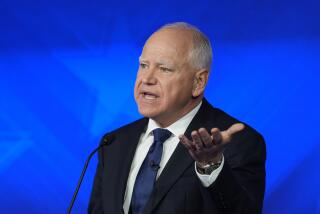Gore in China: Keeping the Miscues Fresh
- Share via
Twenty five years ago, after a career as one of our nation’s strongest and most unrelenting foes of communism, an American president moved to establish relations with the People’s Republic of China. Since then, the expression “Nixon in China” has become shorthand for the actions of politicians willing to confront the sacred cows of their own ideology in order to advance an important cause.
Now another national political player is retracing Nixon’s footsteps. And by the time he returns to Washington, the phrase “Gore in China” will conjure up very different and far less flattering imagery.
Al Gore is going to China at a time when both the president he serves and the administration in which he works are being battered at every turn for their complicity in a fund-raising scandal that has raised the specter of the Chinese government trying to influence American politics and policies. Gore himself has seen his squeaky-clean image sullied by reports that he took part in an illegal fund-raising event held on the premises of a Buddhist temple and that he used White House resources to solicit campaign contributions. He has been derided by members of Clinton’s staff as the administration’s “solicitor in chief,” someone willing to take on in-house fund-raising assignments when the president demurred.
As a result, he has watched his own approval ratings drop almost 20 points since election day. For Gore, whose presidential ambitions are about as well-hidden as his bald spot, the political stakes are both serious and immediate. Last fall, he was given a hero’s welcome by delegates to the Democratic National Convention, while potential rivals such as House Minority Leader Dick Gephardt fumed at the second-class status to which they had been relegated. Gore’s convention speech, along with his strong performance against Jack Kemp in their debate, had begun to elevate him in the early rounds of Campaign 2000 gossip from strong front-runner to formidable favorite.
But now there’s blood in the water, and the sharks who will be waiting for Gore in Iowa and New Hampshire are starting to circle. Likely opponents--Gephardt and Sens. Bob Kerrey of Nebraska and John Kerry of Massachusetts--show increasing willingness to distance themselves from a scandal-damaged White House.
The next presidential campaign is still little more than an abstraction for most of us, but for likely contenders, the race is already underway. George Bush built the political infrastructure that carried him to the 1988 Republican nomination in 1985 and 1986, wooing state legislators, local organizers and other party regulars who organized their communities for him. Until recently, Gore appeared to have a huge head start in these recruitment wars. But grass-roots party types who were fighting for a place on the Gore bandwagon last fall are now watching the fund-raising scandals unfold from a safe distance.
At a time when disentangling himself from these problems has become a political imperative, the vice president’s trip will serve as daily reinforcement of his involvement. As long as Gore remains on the Chinese mainland, every meeting he attends, every photograph he poses for, every word he utters will remind the American people that he and his allies were the first administration in our history to put the White House up for sale.
Because of his credentials as a hard-nosed Cold Warrior, Nixon had the credibility to reach out to the Chinese Communists in a way that a leader without his unique history could never have done. Upon his return, he was hailed for his courage. The Clinton administration, on the other hand, has continued to indulge a Chinese government that imprisons political dissidents in slave labor camps, forces women to undergo abortions for family planning and routinely suspends freedoms of speech, assembly and religion that most of the world’s citizens take for granted.
Under the best of circumstances, Gore would have a difficult time sounding forceful or authoritative while trying to juggle economic and political considerations with egregious human rights violations. Given his current situation, he’ll just look conflicted.
And long after he has returned home, the memories of Gore in China will remind future generations of candidates of an old political axiom: No matter how bad a situation gets, there’s always a way to make it worse.
More to Read
Get the L.A. Times Politics newsletter
Deeply reported insights into legislation, politics and policy from Sacramento, Washington and beyond. In your inbox twice per week.
You may occasionally receive promotional content from the Los Angeles Times.










